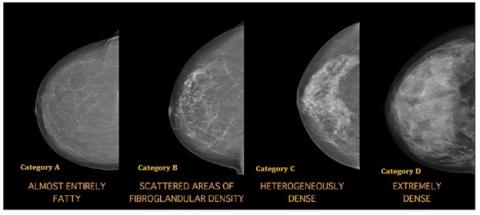Breasts are made up of two types of tissue: non-dense breast tissue (called fatty tissue), and dense breast tissue (fibroglandular tissue including milk glands, ducts, and supportive tissue). The amount of dense tissue compared to the amount of fatty tissue is referred to as your breast density. Density is not related to the size or firmness of a person’s breast—breast density can only be determined by a mammogram. Dense breast tissue is normal and usually decreases with age.
Why is breast density important to know?
Since both normal dense breast tissue and cancers appear as white in an X-ray, cancers are sometimes hidden on a mammogram. Having higher breast density is associated with a higher risk for developing breast cancer, but having even the highest breast density does not mean someone will develop breast cancer. Breast density alone has a small impact on a person’s overall risk—being a woman, and increasing age, are the biggest risk factors.
Breast density notification In Nova Scotia
Breast density is reported according to the American College of Radiology Breast Imaging Reporting and Data System (BI-RADS) standard. There are four categories of breast density, shown below as they appear on a mammogram.

Category A: Almost entirely fatty means that the breasts are almost entirely made up of fatty tissue.
Category B: Scattered areas of fibroglandular density means that there is some dense tissue in the breasts, but the majority of the breast tissue is fatty.
Category C: Heterogeneously dense means that more of the breast is made up of dense tissue.
Category D: Extremely dense means that nearly all of the breast tissue is dense.
In Nova Scotia breast density is assessed by software and automatically included in every screening results letter.
Important to know
- Many women who do not have dense breasts can develop breast cancer. It’s important to get a screening mammogram regularly, as this is the only test proven to find cancer when it’s small, allowing more treatment options and better chance of recovery.
- Breast density can change between visits.
- Density tends to go down as you age but may also be affected by taking hormone replacements, weight gain or loss, and menopausal status.
- Currently there's insufficient scientific evidence to recommend supplemental screening with other breast imaging tests for those with dense breasts.